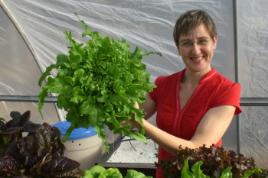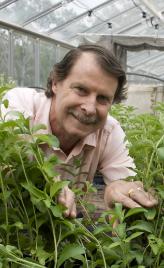Sky's the limit for those who worm their way up
Published on 25 October, 2011
One day in the not too distant future, your local restaurant could literally worm its way to success by creating a closed system for exploiting food scraps, which would otherwise be wasted.
CQUniversity researchers have helped prove the viability of the system, which starts when diners finish their meals and waiters take away the plates for washing.

Elena Churilova worked on the worm farm project while completing her Masters at CQUniversity
Organic scraps are fed to worms in the basement and the resulting 'vermiliquor' is piped (possibly using solar power) to hydroponic vegetable gardens growing on the rooftop.
Meantime, excess worms can be fed to fish being raised in a nearby aquaculture system, and these fish could feature on the restaurant menu.
LINK to audio from the Radio Australia interview
LINK also to Super worm farms could make growing vegies on skyscrapers possible
CQUniversity's Professor David Midmore recently spoke to Radio Australia about the research done in conjunction with the Rural Industries Research and Development Corporation.
He says that as well as avoiding waste, a rooftop garden can reduce heat flowing into the building housing the restaurant, and there are fewer carbon emissions from this closed system (including a reduction in the need for waste transport).
Professor Midmore said the system could also work in remote rural facilities, including mine sites and schools, by avoiding the need to truck in fresh vegetables. There also could be applications for developing countries.
"All the components of the system are available from suppliers right now, but it could be a few years before someone is able to commercialise the whole system and bring it to the marketplace," he said.


